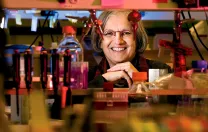The Harvard Malaria Initiative (www.hsph. harvard.edu/research/hmi) began in 1997 as a way of bringing together varied resources and expertise across Harvard to focus on scientific problems of the malaria epidemic. The team—a collaboration among the Harvard School of Public Health, the Faculty of Arts and Sciences, and the Broad Institute of MIT and Harvard—is led by Dyann Wirth, Strong professor of infectious disease, and focuses on understanding the mechanisms of drug resistance in the malaria parasite and identifying potential new drugs and therapeutic strategies. The goal is to use sophisticated tools to better understand malaria and use this knowledge to guide treatment and policy in places where the disease is common. The group’s work is made possible through collaborations with universities and clinical centers in Africa, Asia, and South America, the most extensive being a longstanding partnership with the University of Cheikh Anta Diop, in Dakar, Senegal, under the leadership of Professor Souleymane Mboup. The collaborations focus on training local scientists as well as collaborative research.
In addition to studying the underlying biology of the malaria parasite, the initiative is involved in a collaboration among Harvard’s Medical School and School of Public Health, the Broad Institute, and Genzyme Pharmaceuticals to discover new antimalarial drugs, for which there is pressing need because current drugs are very similar to one another. The team hopes to find completely new ways of targeting malaria by screening vast numbers of molecules to see which are effective against the parasite.
One reason there are so few antimalarial drugs is a lack of financial incentive for drug companies, given that most malaria-ridden populations are located in poor countries. The Harvard initiative has received funding from Medicines for Malaria, a foundation that works with public and industry partners to develop antimalarial drugs. Professor of biological chemistry and molecular pharmacology Jon Clardy, who is leading the research project, says that, like any drug development process, it will take years to bear fruit because of the extensive testing and approval process required.
But even if tangible therapies are still years in the future, the project is already generating new knowledge about the basic biology of the parasite. For every drug that is active against Plasmodium, the researchers can investigate which aspects of the parasite’s biology it is targeting. “With malaria, the use of these screens is relatively new,” Clardy says. “There’s a lot to discover, and a lot about the organism that we don’t understand.”






